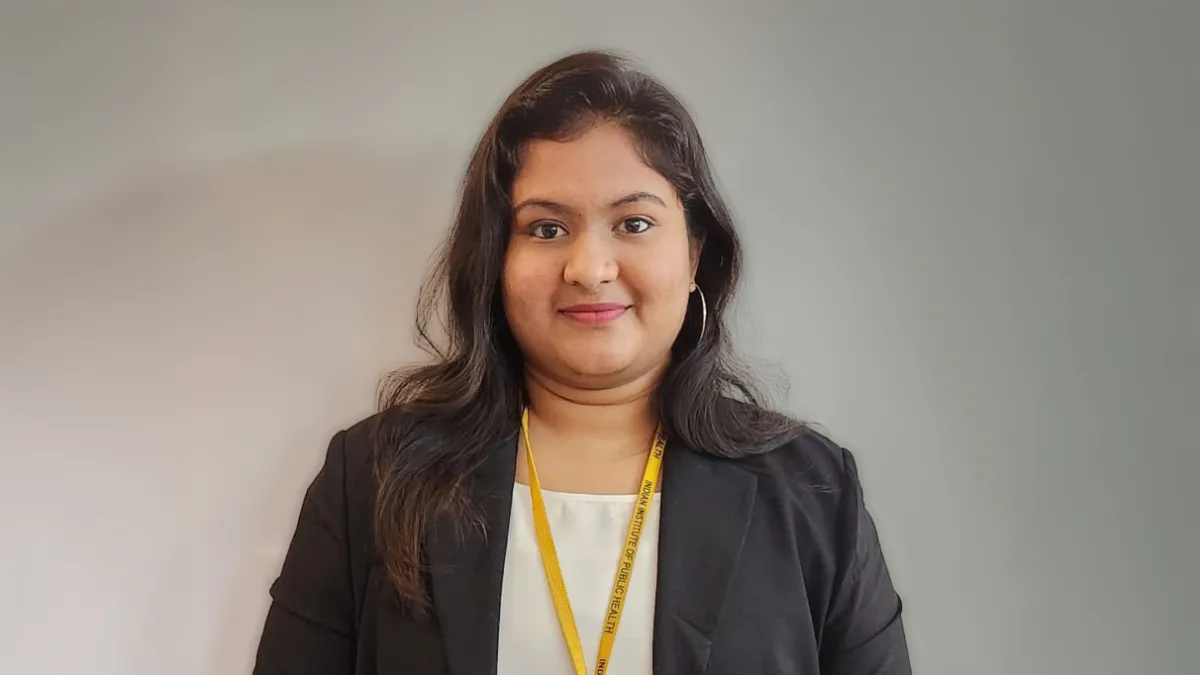Student Conversations: A Future Research Talent's public health journey

Even when Dr Nivedita Satyannagari is not doing research, she enjoys conducting experiments—in the kitchen, with food.
“Experimenting with recipes gives me a creative outlet and reinforces my belief in the importance of small, sustainable lifestyle changes,” she says, “It also aligns with my commitment to promoting healthier lifestyles.”
To her, the entire process of preparing, cooking and consuming food is a reminder of how public health can impact personal everyday lives.
A dentist-turned-public health professional, Nivedita works at the intersection of healthcare and research. Her goal is to reduce the burden of chronic diseases and empower communities to lead healthier lives by combining research and field-based interventions.
Thanks to a prestigious Future Research Talent (FRT) Award from The Australian National University (ANU), Nivedita has taken a significant step toward this goal.
“The FRT program is a collaborative initiative between ANU and select Indian institutions, including the Public Health Foundation of India,” explains Dr Haribondhu Sarma, Senior Lecturer at the National Centre for Epidemiology and Population Health (NCEPH).
Alongside three other students from the Foundation, Nivedita had the opportunity to engage in short-term research projects at ANU.
“When I learned I was selected, I was thrilled and deeply honoured, as it validated my dedication to public health research and gave me an exciting platform to work with esteemed international collaborators,” she says.
For the first time, Nivedita lived outside India, staying in Australia for three months to do research under Dr Sarma’s supervision.
“I enjoyed learning about Australian culture and collaborating with researchers from diverse backgrounds,” she recalls, “The warm and inclusive research environment, along with the support from peers and faculty, made the adjustment seamless.”
At NCEPH, Nivedita focused on how educational interventions could be integrated to address multimorbidity in India.
Multimorbidity—the coexistence of multiple chronic health conditions in an individual—is a complex challenge in India. As part of a broader strategy, implementing educational interventions may prove feasible for managing and preventing it.
“Nivedita’s dedication and understanding of public health were evident throughout her research,” Dr Sarma notes, “Her work provided valuable insights into the challenges and opportunities of implementing multimorbidity interventions in the Indian policy context.”
Reflecting on her time here, Nivedita feels the award provided her with a broader perspective and valuable connection with global experts in the field.
“These experiences have prepared me to address global health challenges effectively,” she says.
What sparked your interest in public health?
My interest began during my career as a dentist. While treating patients, I noticed the strong link between systemic diseases and oral health, which highlighted the broader impact of population health on individual wellbeing.
This awareness led me to explore preventive and community-based approaches to healthcare. Over time, my passion evolved to focus on addressing healthcare inequities and implementing sustainable interventions for chronic diseases and multimorbidity, especially in resource-limited settings.
Your research at NCEPH aligned with these interests, didn’t it?
Indeed, our project focused on exploring the feasibility of educational interventions for managing multimorbidity in low- and middle-income countries, or LMICs, like India. It examined ways to integrate these interventions into existing healthcare systems.
Under Dr Sarma’s mentorship, I identified gaps in multimorbidity management and potential strategies for scalable solutions.
How has this research experience deepened your understanding of multimorbidity prevention?
This experience underscored the importance of community-level interventions, intersectoral collaboration, and strengthening primary healthcare systems. It deepened my understanding of the systemic barriers and the need for cost-effective, culturally appropriate solutions in India. Seeing how research could translate into impactful public health is very fulfilling.
What advice would you give to future students looking to take on research at NCEPH?
Be open to learning and collaborating with diverse teams. Engage actively with mentors. Explore multidisciplinary approaches, and focus on how your research can create meaningful societal impact—take full advantage of the resources and expertise available at NCEPH!
Where do you see yourself heading next?
Looking ahead, I envision myself blending research and implementation science to bring evidence-based solutions to real-world challenges. I aim to work with global health organisations, contributing to policy changes and improving healthcare delivery for underserved populations.
If you could make one change in the world through your work, what would it be?
I am particularly focused on addressing health disparities in LMICs, where marginalised populations often lack adequate access to quality care.
If I were to make a change, it would be to create equitable healthcare systems that provide accessible, holistic, and affordable care for chronic and multimorbid conditions.
